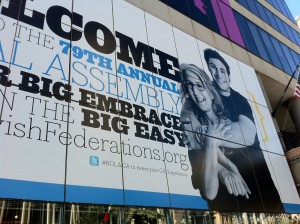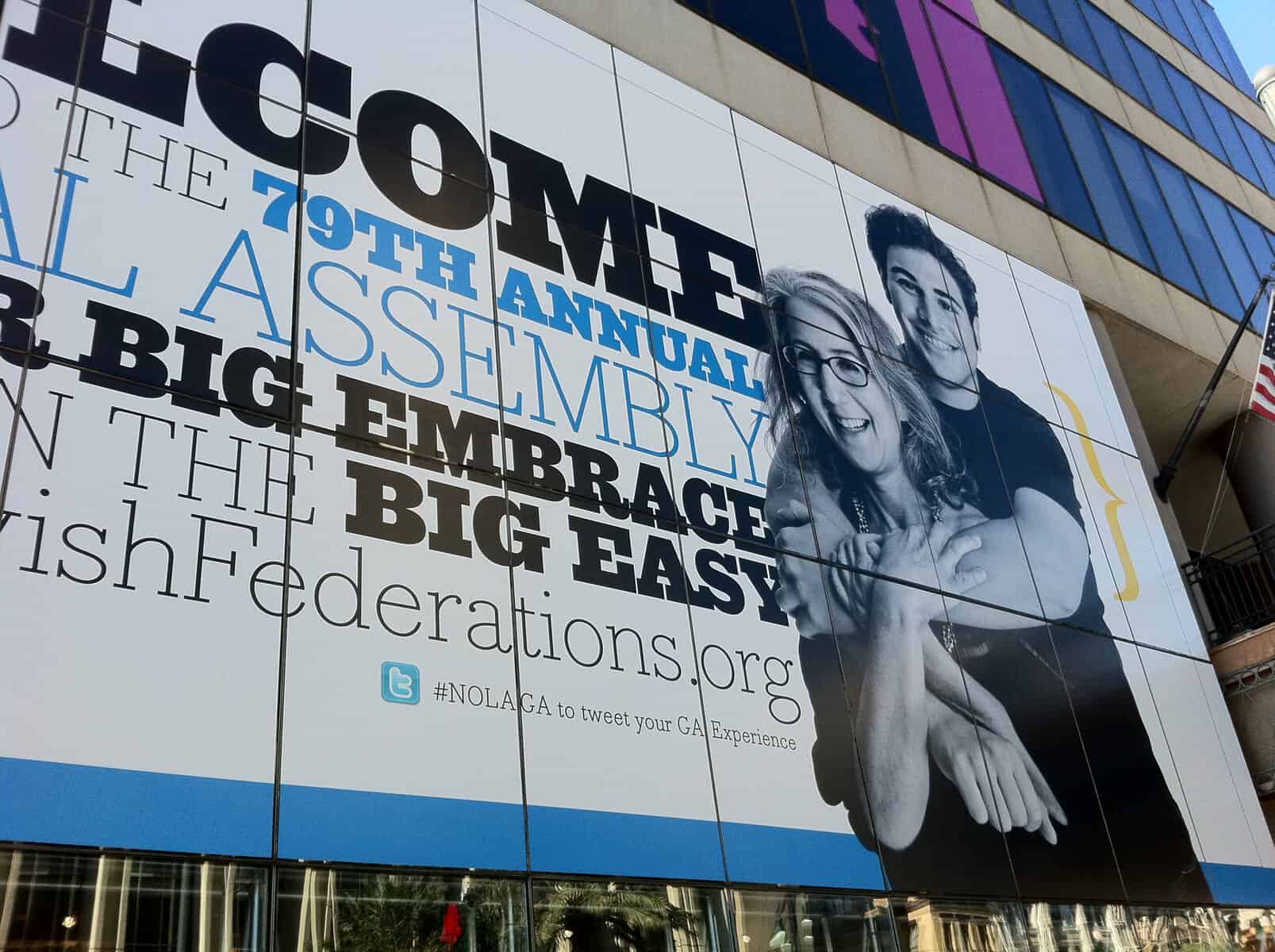 Jason Leibowitz, 25, stepped out of a cab two years ago in front of the convention center in New Orleans and discovered that he was smiling back at himself from the murals draped across the building’s front entrance.
Jason Leibowitz, 25, stepped out of a cab two years ago in front of the convention center in New Orleans and discovered that he was smiling back at himself from the murals draped across the building’s front entrance.
When his picture was taken at the JFNA (Jewish Federations of North America) offices a few weeks earlier, he had no idea he would find his photograph, larger than life, posted throughout the hall, welcoming attendees into the Federation’s General Assembly’s three day symposium.
“I couldn’t believe it when I saw it,” Leibowitz exclaims. The serendipitous surprise eventually proved to be prophetic because several months later, he discovered that much of his personal journey was molded by the Federation’s recipient agencies.
Today, as JFNA’S senior program manager for the young adult population, Leibowitz’s department assists 155 federated communities whose young adult professionals create and manage programming for the 22- to 45-year-olds in their cities. In Tidewater, Amy Weinstein heads up the YAD division. Leibowitz is also part of the management team for the 300-person National Young Leadership Cabinet, which develops next generation leadership.
“My parents, Fern and Larry, are from New York and my Jewish lens is probably more a reflection of their Northern upbringing than my southern roots,” says Leibowitz.
He laughs about his recent house hunting. “As soon as my maternal grandfather learned I was interested in moving from an apartment in New York City to a co-op in Brooklyn, he took the lead on my home search. Not only was he excited, he had worked in the real estate market in Brooklyn Heights for over 30 years.”
Leibowitz is thrilled to live in Brooklyn’s unpretentious neighborhood. He loves that he can walk to a kosher restaurant. “Since preschool, I have longed to be fully immersed in a thriving Jewish community,” he says. His personal story reveals that his Jewish soul, his “nashama,” prompted many of his life’s transitions.
Leibowitz began his Jewish journey, attending the JCC preschool on Newport Avenue and kindergarten at the Hebrew Academy of Tidewater on Thompson Lane. While at Cape Henry during his elementary years, he studied at the United Hebrew School and Congregation Beth El’s Sunday school.
One afternoon his parents received a phone call from Leibowitz’s first grade teacher, reporting a class problem. During the Christmas holiday party, their son was caught telling his classmates that Santa Claus was not real. Unbeknownst to them, Leibowitz had secretly tucked a yamulke into his book bag and wore it during the holiday celebration.
“Even as a kid, I wanted to learn more from my United Hebrew School lessons than memorization. I wanted to understand the emotional connections to Judaism and its peoplehood,” Leibowitz elaborates. “In Gimel, Yardena Abrons brought the classroom to life. She later became my tutor for my Bar Mitzvah on April 1, 2000.”
By sixth grade, Leibowitz transferred to Norfolk Collegiate and enrolled in Teen Dialogue with the JCC’s Rabbi Stu Warner. On Collegiate’s campus during his free period, he attended a 30-minute “Jewish club” led by Rabbi Ephraim Adler, a Kollel educator. Leibowitz’s search for Jewish meaning intensified during his high school years.
He went on his first Shabbaton to New York City and insisted that his family begin to go to synagogue on Shabbat and have Friday night dinners. Each morning, before he went to school, Lebowitz put on tefillin.
As he continued his practice, he felt as if he lived in two separate worlds, the observant and the secular. Challenged often by his uncle, Leibowitz welcomed the opportunities to debate about history, politics and his religious practice. It was these intimate conversations that meant more to him than his activities with the local BBYO and USY groups.
Applying to colleges, Leibowitz only considered schools with large Jewish populations, enrolling at New York University.
Attending Hillel weekly, he immersed himself in its “amazing” activities. Leibowitz learned that it was okay to take a leap of faith and then figure out the reasons for some religious behaviors. His observance became more Orthodox, keeping kosher, and becoming Shomer Shabbas. He loved going to Friday night services at the Hillel House and sharing Shabbat dinner with friends. He even took Hebrew as a foreign language.
Becoming a member of the fraternity Alpha Epsilon Pi, aka AEPi, Leibowitz and his fraternity brothers enjoyed working on social action projects, like building a playground in Queens and a sukkah on campus.
Staying true to his beliefs has always been important to him. Still, Leibowitz laughs when he talks about his parents’ reaction to one of his homecomings. “Imagine my parents surprise when they opened up the refrigerator door to find the interior light bulb covered in tape preventing me from activating the electricity during Shabbat,” he chuckles.
In 2006, during his summer between his freshman and sophomore years, Leibowitz went to Israel on Birthright Israel through Oranim with his fraternity brothers. Unexpectedly, he found that being Jewish in Israel was not characterized by religious observance. It was defined by a sense of community—an overarching belief that the Jewish citizens saw themselves as one people. This new understanding broadened his perspective and offered him a new sense of balance.
In the spring of 2007, he returned to Israel to study for a semester at Hebrew University in the Rothberg International School through the Masa Israel program. He took some classes with Professor Meron Medzini who grew up with Golda Meir and taught history by relating personal stories. “It was unbelievable to feel that intimate connection to Israeli history!” he says. He also studied at the Ulpan, taking his foundational alpeh bet skills quickly to the level of conversational Hebrew.
After college graduation, Leibowitz felt compelled to work in the Jewish world. His first job was with Bikkurim, a Federation supported organization that incubates new Jewish non-profits by providing funding, office space, grant applications and assistance in creating a governing board, all with the intent to help it expand. Bikkurim’s office space was located on the same floors as JFNA’s New York office.
Leibowitz often wandered over to the Federation side of the building. With his gregarious personality and engaging smile, he made lots of friends. Beth Mann, associate vice president for development affinities and Tali Strom, senior director of National Young Leadership asked him to consider a job with JFNA.
In this new position, Leibowitz feels as if he is making a real difference. He is part of the team that created Tribefest, an introductory program for young adults to acquaint themselves with the Jewish world through interactive sessions, strategic partnerships, roundtables and engaging keynote speakers.
He is now intricately involved in planning and supervising the 2013 Summer Young Adult Trip to Israel where he will lead the participants on a mission specifically designed to highlight programs relying on funding from Federation dollars.
He already knows that the participants will pick corn on a farm for 45 minutes to feed 200 people as a means of understanding Project Leket. They will also travel to Mevaseret Zion Absorption Center, run by the Jewish Agency to farm, cook and make traditional Ethiopian coffee along with the new Ethiopian Israelis.
Excited, Leibowitz readily admits, “The Federation has made me who I am today.” His Jewish values, his pride for Israel and his participation in the global Jewish world are born from his parents’ emotional support and their desire to provide him with many Jewish opportunities that were, coincidently, Federation based.
“When you are sitting in the stands at Yankee Stadium, and everyone around you is cheering for the same team, there is an emotional connection, a deep rooted commitment because you know and the people around you know, that you are ‘one.’ That, is what life is like for me now,” Leibowitz says. “The people at work and in my neighborhood are all rooting for the same team, and I love it!”
*The italics are agencies funded by United Jewish Federation of Tidewater.
by Karen Lombart

